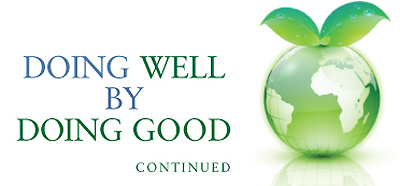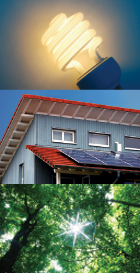


COLLEGIATE COMMITMENTS
If tomorrow’s business leaders are studying today on college campuses, there’s more good news for the sustainable movement. According to a special Chronicle of Higher Education issue on sustainability, a growing number of higher-education institutions are beginning to transform their campuses, their operations, their policies and their teaching to reflect a commitment to sustainability. Dozens of U.S. colleges have announced that they are moving toward becoming sustainable campuses, and the Association for the Advancement of Sustainability in Higher Education (www.aashe.org) has grown from 35 to more than 480 members since its inception.
Activities include putting up green buildings, planting native landscapes, switching to renewable power, supporting local communities, developing clean technologies, establishing policies on living wages and finding ways to turn those efforts into teachable moments and research projects.
Fairleigh Dickinson University is investing heavily in the future with the development of various initiatives, in particular the construction of the new Monninger Center for Learning and Research, a “green” (i.e., energy efficient and sustainable, as certified by the New Jersey Green Builders) library/learning center that will become a hub for learning on the College at Florham campus and in the larger surrounding community.
One of the top projects to be supported by FDU NOW: The Campaign for Fairleigh Dickinson University, this project is engaging FDU’s administrative leadership, staff, students and faculty, along with leaders from New Jersey-based corporations (such as FirstEnergy/JCP&L) and the surrounding community.
In addition, FDU administrators are taking green measures into account in planning the renovation of the Student Union Building at the Metropolitan Campus. The University is also a member of the New Jersey Higher Education Partnership for Sustainability.
On many campuses, student organizations have become watchdogs for sustainability; influencing changes in college operations, both large and small (see Easy Being Green). Armed with Internet research, student groups are investigating institutional operations like energy use, food purchasing, investments, transportation and waste disposal. They are pushing administrators to approve new projects and set higher goals for sustainability.
National networks are helping students share strategies with one another and organize sophisticated, often successful proposals for campus innovations and reforms. For example, RecycleMania (www.recyclemaniacs.org) encourages universities and colleges to participate in a 10-week competition. Each spring, institutions are challenged to collect the largest amount of recyclables per capita and the largest amount of total recyclables, and to produce the least amount of trash per capita or have the highest recycling rate.

FDU’s College at Florham, with the help of its Green Club, held a “Recyclemania” competition in order to encourage recycling on campus. Statewide, FDU ranked fifth among New Jersey schools in the 2007 competition, with more than 23,000 cumulative pounds of recyclables collected (8.8 pounds per person).
Inspired by the College at Florham’s response to Recyclemania, a similar competition is being planned for FDU’s Metropolitan Campus, and a Friends of the Environment club has been started there.
| “Much depends on whether business leaders and managers gain greater awareness of sustainability and continue to choose to adopt sustainability-related values, strategies, principles and practices.” — Jeana Wirtenberg, Institute for Sustainable Enterprise |
|---|
THE FUTURE AND BEYOND
Where will sustainable business practices be in the next 10 to 20 years? “Much depends on whether business leaders and managers gain greater awareness of sustainability and continue to choose to adopt sustainability-related values, strategies, principles and practices,” says Jeana Wirtenberg, director of external relations and services at FDU’s Institute for Sustainable Enterprise. In collaboration with the Institute for Corporate Productivity (formerly the Human Resource Institute), the ISE has developed three possible scenarios, which are included in the American Management Association report Creating a Sustainable Future.
Wirtenberg explains, “Scenario 1, called “Things Fall Apart,” depicts an increasingly anarchic world in which a global war for natural resources has led the world to the cusp of World War III.”
Scenario 2, known as “Muddling Toward Sustainability,” she continues, “depicts a mixed bag of failed legislative efforts and uncaring business leaders.”
“Scenario 3, which is our dream and aspiration, is a ‘Global Sustainability Culture,’” says Wirtenberg. In this case, a majority of people in nearly every nation believe that environmental degradation is a true threat, global initiatives are in place to further reduce social and economic inequalities among nations and business organizations increasingly embrace sustainability. “Truly, she concludes, “that is the only win-win-win solution.”
Opening Page | Profitability | Barriers
Collegiate Commitments
FDU Magazine Home | Table of Contents | FDU Home | Alumni Home | Comments
Images this page (excluding globe) ©iStockPhoto.com/Julien Grondin, DW Sussman, Cyril How and Ooyoo.
©Copyright 2008 Fairleigh Dickinson University. All rights reserved.
For a print copy of FDU Magazine, featuring this and other stories, contact Rebecca Maxon, editor, 201-692-7024 or maxon@fdu.edu.